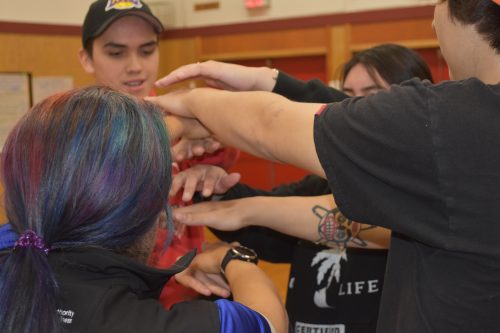Sport for Life workshop empowers Indigenous leaders
 Indigenous people tend to vote with their feet, according to Sport for Life workshop facilitator Dorothy Paul, and that means they’re going to start walking if you don’t successfully engage them. That’s why she’s signed on to be one of the leaders of the Indigenous Communities: Active for Life workshops, which encourage participants to embrace active living initiatives and create physical literacy and quality sport programming that meets the needs of First Nations, Inuit and Metis peoples across the country.
Indigenous people tend to vote with their feet, according to Sport for Life workshop facilitator Dorothy Paul, and that means they’re going to start walking if you don’t successfully engage them. That’s why she’s signed on to be one of the leaders of the Indigenous Communities: Active for Life workshops, which encourage participants to embrace active living initiatives and create physical literacy and quality sport programming that meets the needs of First Nations, Inuit and Metis peoples across the country.
“One thing I really like about the resources is that the five Truth and Reconciliation Calls to Action related to sport and physical activity are included,” Paul told the participants, during a recent workshop held on Coast Salish territory in Victoria.
“We need to be ensuring that not only are Indigenous peoples included and celebrated in sport and physical activity, but they’re also being given the tools to share their learning with their communities and empower them.”
Paul lives at Tsartlip First Nation and originally hails from Old Massett and Musgamagw Dzawada’enuxw First Nation. She brings to her work a passion for those who have been marginalized or left behind. Through her work as an educator she’s able to share her cultural expertise alongside co-facilitators such as Alex Jules from the Kyuquot First Nation in Courtenay. Rather than relying on the customs and practices of other Canadians, she offers a vision of the physical literacy world that is resolutely Indigenous.
In one exercise, Paul leads the group in attempting to lift a seated person off the ground. Each of the four people involved represent the needs of the person they want to empower: physical, mental (intellectual and emotional), spiritual, and cultural. She then brainstorms with them ways that they can ensure their programming meets all four of those needs, emphasizing the importance of teamwork.
“These workshops provide leaders with the knowledge, skills, and capacity to develop and deliver physical literacy and quality sport programming in their communities, and envision the sort of experience they want to share with their community,” said Emily Rand, Manager of Special Projects at Sport for Life.
“As we continue to mobilize this knowledge across the country, our hope is that Indigenous communities and athletes will share their stories and successes so that we can all celebrate together.”
The workshop was a partnership between Sport for Life, Victoria Native Friendship Centre and ISPARC.
